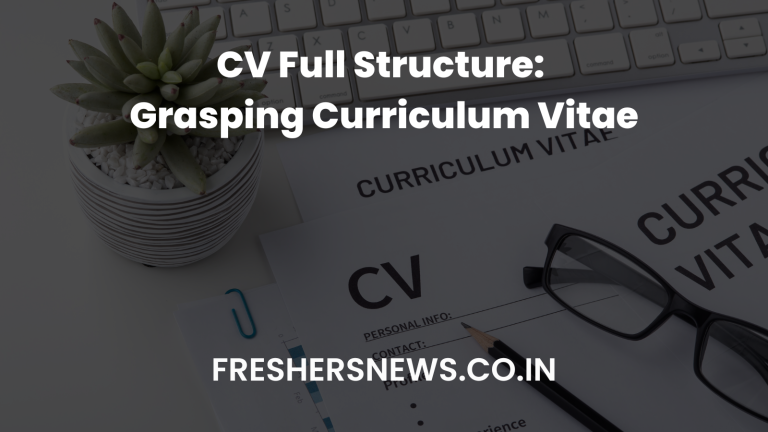In the Professional world, especially while looking for work or educational open doors, the expression “CV” holds critical significance. Another way to say “Educational plan Vitae” is that a CV is an extensive record illustrating a person’s instructive foundation, work insight, abilities, accomplishments, and other vital data. Expressing one’s capabilities and reasonableness for a specific work or scholarly program is crucial. In this article, we dive into the full importance of a CV, its motivation, parts, ways to make a powerful CV, and its importance in different settings. Here, we are talking about CV Full Structure: Grasping Curriculum Vitae.

Here, we are talking about CV Full Structure: Grasping Curriculum Vitae:
Grasping CV
Definition
Curriculum Vitae, frequently shortened as CV, is a Latin expression that means “course of life.” In proficient settings, a CV alludes to a point-by-point record summarizing a person’s instructive capabilities, work insight, abilities, accomplishments, distributions, and other vital data connected with their profession or academic pursuits.
Purpose
The fundamental role of a Curriculum Vitae is to give a complete outline of a singular expert or scholastic foundation to possible businesses, academic establishments, or grant councils. It assesses an up-and-comer’s reasonableness for a particular job or program. It assists selection representatives or leaders with surveying capabilities, skills, and achievements.
Parts of a CV
Personal Information
This segment incorporates fundamental individual subtleties like name, contact data (address, telephone number, email), and, occasionally, an expert photograph.
Professional Rundown/Objective
A short assertion summing up the competitor’s vocation goals, fundamental abilities, and subject matters. This part gives a preview of the singular’s profile and professional yearnings.
Educational Background
Subtleties of scholarly capabilities, including degrees acquired, foundations joined in, dates of study, and any academic distinctions or grants got.
Work Experience
A sequential rundown of business history, including position titles, names of associations, dates of work, and a portrayal of obligations and accomplishments in every job.
Skills
An outline of pertinent abilities and capabilities, including specialized skills, language capability, PC capability, and other specific abilities applicable to the ideal position or field.
Achievements and Awards
Acknowledgment, grants, respects, or accomplishments procured all through the up-and-comer’s profession or scholarly excursion, featuring remarkable execution or commitments.
Publications and Presentations
Subtleties of examination distributions, introductions, gatherings joined in, or papers created by the up-and-comer, especially applicable for scholastic or exploration situated positions.
Professional Affiliations
Participation in proficient associations, affiliations, or social orders connected with the applicant’s main subject area, showing dynamic contribution and systems administration inside the business.
References
Contact data for proficient references who can vouch for the competitor’s capabilities, character, and hard-working attitude. Giving 2-3 references, including previous managers or colleagues, is expected.
Ways to Make a Compelling CV
Tailor it to the Position.
Tweak your CV for each employment form, featuring applicable abilities, encounters, and accomplishments that align with the gig prerequisites.
Be Compact and Clear
Keep the CV compact and efficient, utilizing list items and short passages to pass on data plainly and productively.
Use Activity Verbs
List items with activity action words (e.g., made due, created, executed) to depict achievements and obligations.
Quantify Achievements
Whenever the situation allows, measure accomplishments utilizing numbers or rates to give substantial proof of achievement and effect.
Proofread Carefully
Check for syntactic mistakes, grammatical errors, and arranging irregularities, guaranteeing that the CV is clean and proficient apparently.
Update Regularly
Keep your CV refreshed with the most recent instruction, work insight, abilities, and accomplishments, mirroring your ongoing capabilities and achievements.
Meaning of CV
Job Applications
A very much-created CV is fundamental for work searchers to feature their capabilities and encounters with likely businesses, expanding their possibilities of getting meetings and propositions for employment.
Academic Pursuits
In the scholarly community, a CV reports a specialist’s academic foundation, distributions, introductions, awards, and other insightful exercises, helping with professional success and subsidizing open doors.
Professional Networking
CVs are often shared during proficient systems administration occasions, gatherings, or online stages like LinkedIn, empowering people to interface with peers, coaches, scouts, and expected associates.
Evaluation and Selection
Businesses, educational establishments, grant boards of trustees, and subsidizing organizations use CVs to assess competitors’ capabilities, abilities, and reasonableness for explicit jobs or projects.
FAQs
What is a CV?
A CV, short for Curriculum Vitae, is a complete record that frames a person’s instructive foundation, work insight, abilities, accomplishments, and other pertinent data connected with their expert or academic pursuits.
How is a CV unique to a resume?
While a CV and a resume act as devices for requests for employment, a CV is commonly longer and more nitty gritty, zeroing in on scholastic accomplishments, exploration, distributions, and other academic exercises. However, a resume is more limited and compact, underscoring work insight, abilities, and capabilities pertinent to a particular work.
What is the reason for a CV?
The prominent role of a CV is to give a complete outline of a singular’s capabilities, encounters, and achievements to possible managers, academic foundations, or other pertinent substances. It is a device for surveying a competitor’s reasonableness for a particular job, program, or opportunity.
What ought to be remembered for a CV?
A CV regularly incorporates individual data, an expert synopsis or goal, instructive foundation, work insight, abilities, accomplishments and grants, distributions and introductions, proficient affiliations, and references.
How long should a CV be?
The length of a CV can shift depending on individual conditions. However, it is, for the most part, prescribed to keep it compact and centered. While there is no severe cutoff, a CV is commonly between 2 to 3 pages long for most experts.
How would it be advisable for me to design my CV?
Designing your CV in an unmistakable, coordinated way is crucial, as well as utilizing headings, list items, and reliable organizing for simple coherence. Pick an expert textual style and avoid using excessive varieties or illustrations that might divert from the substance.
Should I tailor my CV for each occupation application?
Indeed, it is prudent to alter your CV for each request for employment, featuring pertinent abilities, encounters, and accomplishments that align with the position’s particular necessities.
What are a few usual mix-ups to avoid while making a CV?
Normal slip-ups to avoid incorporating spelling and linguistic blunders, utilizing a conventional layout without customization, including insignificant data, giving off base or deluding data, and neglecting to refresh the CV routinely.
How significant is a CV in the employment form process?
A very much-created CV assumes an urgent part in the request for employment process, as it fills in as the initial feeling that potential bosses have of a competitor. A convincing CV can expand the possibilities of getting meetings and propositions for employment.
Can a CV be utilized for scholarly purposes?
Indeed, a CV is ordinarily utilized in the scholarly world to record a scientist’s instructive foundation, distributions, introductions, awards, and other insightful exercises. It helps with professional success, financing open doors, and scholarly systems administration.
Conclusion
Finally, the Curriculum Vitae (CV) is a fundamental record for people exploring business, the scholarly community, and expert systems administration. A very much-created CV upgrades permeability, validity, and seriousness in the gig market or intellectual circle by thoroughly outlining one’s instructive foundation, work insight, abilities, and accomplishments. Grasping the reason, parts, and ways to make a viable CV engages people to introduce themselves really to likely businesses, scholarly establishments, or expert contacts, working with professional success and opening doors for development.



